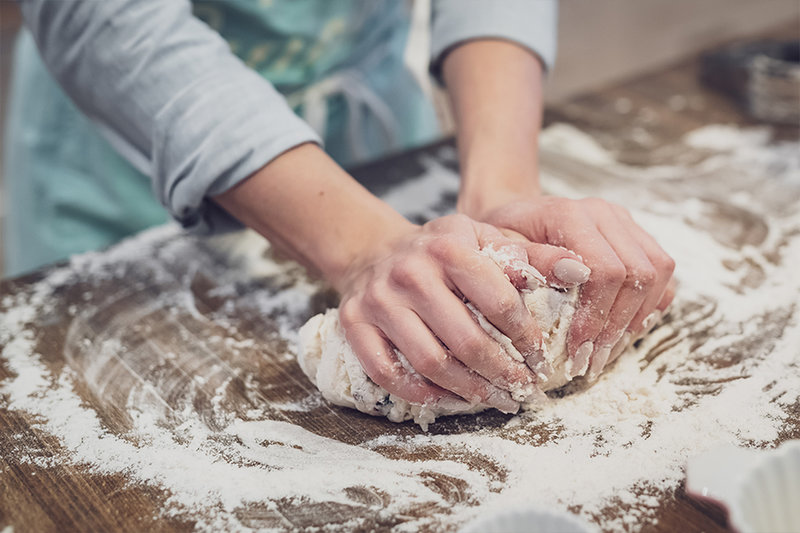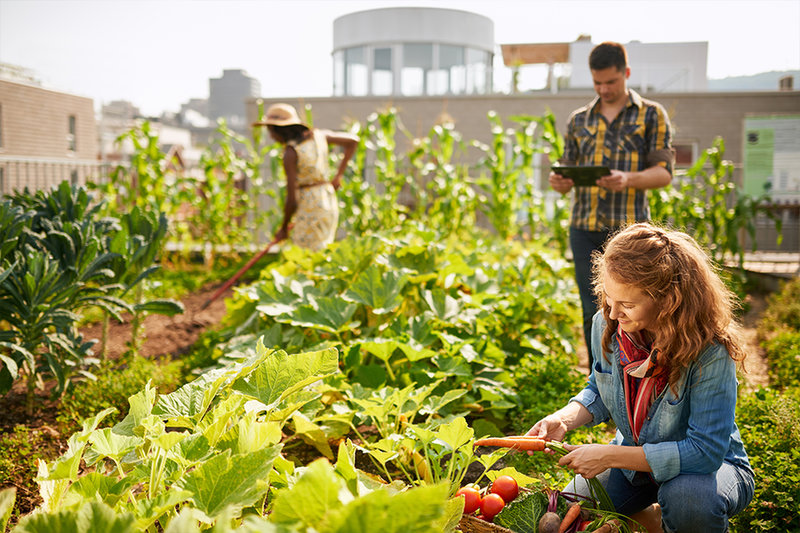Nobody living through the Covid-19 pandemic needs reminding that disruption necessitates change. What no-one can yet know is how enduring the change might be. When the most disruptive event the world has seen for 80 years is over and gone, just how changed will we be?
Even in the face of crisis, when the priority is coping with the here and now, that imponderable question burns and fascinates. There are many variables that make the question unanswerable but arguably the greatest is not knowing when, or indeed if, the post-Covid era will arrive.
The duration of the intermediate phase some countries are in and more can hope to enter soon, which, even as the strictest lockdowns are gradually eased, still involves continued extraordinary measures and significantly changed behaviour, is dependent on scientific discovery, and its duration can only be estimated.
Vital and valuable
The Covid-19 crisis is "making people think more about food and not just as entertainment or an experience to have but that it is one of life's necessities", says Dr Darian McBain, global director of corporate affairs and sustainability at seafood giant Thai Union Group, adding how food shortages in supermarkets have prompted not only consumers but governments to think about food security "in a different way".
"The crisis has made people more aware that food doesn't grow on supermarket shelves," Rachel Wilshaw of Oxfam adds. All the industry and non-industry experts discussing this topic make similar observations. In fact, it would be surprising if the fundamental shock of the outbreak and accompanying threat to food supplies had not led people to reappraise how they view food and take it less for granted. It also follows that for that change to be lasting, the memory of panic and uncertainty has to be firmly imprinted on the public consciousness and retained when fears about having enough food have long subsided.

increased demand for certain products has now subsided
It would not be unduly cynical to expect the feelings of fear to fade for the majority of consumers in developed countries who have experienced little in the way of deprivation when it comes to food. While quickly reacquired complacency will be a factor, the far greater pressure acting on consumers is that, for the coming months or even years, they will still have so much else to worry about.
However, while initial feelings of anxiety may dissipate, consumer attitudes to food may still be fundamentally altered by the changes in lifestyle and food culture enforced by the pandemic.
Jahna Lindsay-Jones, global client relationship lead for the US food and beverage sector at global communications firm Edelman, characterises the coming period of stabilisation as "sustained shock", adding food and beverage is feeling "like no other sector" the impact of consumers focusing on the true necessities of life.
Sustained disruption
In that context, one relatively safe prediction may be that the longer it takes for the mortal threat of Covid-19 to be neutralised, the more permanent the changes to food culture and consumer preferences are likely to be.
Survey data on US consumer behaviour and values during the crisis and beyond, published last month by Edelman, suggests many consumers at least intend to maintain changes in behaviour.
The emergence of cooking at home and cooking for the family is going to have a lasting impact.
According to Edelman's April survey of 2,000 US consumers, 56% expect to continue cooking more at home once the economy reopens, and 47%, especially millennials (63%), believe they will continue eating the comfort foods they enjoyed during the pandemic.
Meanwhile in the UK, in a survey by YouGov last month, 42% of participants said they value food and other essentials more since the pandemic, while only 9% said they want life to return to "normal" after the pandemic. "People are spending time together, are baking together, and rediscovering the joy of cooking," says Mary Jane Melendez, chief sustainability and social impact officer at US-based General Mills.

Protected meal times have become more common, but will the trend continue post-Covid?
Thai Union's McBain goes further, identifying this specifically as an enduring trend. "I think the emergence of cooking at home and cooking for the family is going to have a lasting impact," McBain says. "I think another trend that is coming out is protected meal times. At the moment, people have the time to sit down with their families and have potentially three square-meals a day, which they haven't been able to have for many years because of their busy lifestyles."
At the same time, trust in brands has been key for consumers and this is clearly true for food manufacturing. "We are seeing consumers coming strongly to foods that make them feel good at times like this, and turn to brands they can trust," says Jonathan Horrell, sustainability director at snacks giant Mondelez International.
Global food companies appear well-placed as the stabilisation and economic recovery phase begins. Cyrille Filott, global strategist for consumer goods at Netherlands-based banking group Rabobank, sees more pressure on SMEs in both the crisis and recovery periods than on larger food firms. "Smaller brands, new products may not do that well," he suggests.
Debate over extent of change
While it would be strange not to wish any beneficial effects of the pandemic on food awareness and purchasing would be long-lasting, some are far less convinced than others consumption habits will be permanently changed.
"We are looking at some sort of fairly long-lasting structural transfer of sales to in-home," says equities analyst Martin Deboo, who covers the food and beverage sector for investment bank Jefferies, who is "cautious" about how Covid-19 will reshape the food market.
"I have a view that things never change quite as much as opinion-formers think they will," he says. "We are seeing explosive growth in flour and baking products but it might just be a reflection of more time to spend on food preparation and might not last".

There has been a home baking boom - but is it likely to last?
Like those who foresee greater transformation, Deboo bases his outlook on what has transpired during the crisis and, accordingly, identifies the transfer from out-of-home to home consumption as the most significant shift.
While the impact of this shift on food manufacturers is being overstated in Deboo's view, he nonetheless estimates it has given some food companies a 5-6% sales uplift during the crisis, a "huge number by food industry standards", and expects some of this will be enduring. "I think we are looking at some sort of fairly long-lasting structural transfer to in-home," he says.
There is also discussion about how the upcoming global recession could affect consumption and consumer habits. Rabobank's Filott points out in the early stages of recessions consumers tend to eat indoors more, and also spend more on food consumed at home to compensate for not being able to go out as often. This would suggest a continuation of food preparation and meal habits into and through the period of economic recovery and into the post-Covid era.
According to the Edelman poll, some 56% of Americans say they "expect to be more concerned about price and less concerned if a food or beverage product is organic/sustainable after the economy re-opens."
Questioning the system
Many food campaigners and academics believe the pandemic has exposed fundamental weaknesses in the global food system and increased the case for radical change in how food is produced and distributed.
"The challenge is "not just to build back but build back better," says Professor Melissa Leach, director of the Institute of Development Studies, based at the University of Sussex in the UK. "Covid has absolutely exposed the fragility of the current globalised economy and globalised food systems, its reliance on transcontinental transactions, on just-in-time production and on these very long international supply chains, which of course are very carbon-intensive."
If decentralisation is an outcome of this that will be a very good thing.
Leach continues: "I think what we've also seen during the response in many countries and many localities is the seeds of some more resilient and equitable ways of organising things, which really come down to economies that operate on much more localised and inclusive principles. And I think what we're seeing is that these might be more resilient to shocks.
“They're providing some resilience to Covid-19 but may also be important to future shocks that are going to come about through the effects of climate change, as well as future pandemics, and provide, perhaps, a way in to thinking about transformations that are much needed anyway."
US-based author and food campaigner Professor Marion Nestle shares this sentiment. "If this does any good at all, it will be to show the value of more local and regional food systems and not being dependent on a food system that is set up as ours is with large corporations centralising production facilities, so that if something goes wrong in one of those facilities, the whole thing falls. If decentralisation is an outcome of this that will be a very good thing."
Regionalisation and resilience
Professor Olivier De Schutter, UN Special Rapporteur on extreme poverty and human rights and co-chair of the International Panel of Experts on Sustainable Food Systems (IPES-Food), points out in recent lockdowns these types of localised networks actually proved less resilient than mass production and distribution, though that doesn't mean that resilience could not be built into them in the future.
"In many countries under lockdown, direct farmer-to-consumer systems have been obstructed," says Prof. De Schutter. "Farmers' markets were closed, the closure of schools and restaurants meant that local farmers supplying them ran out of business. In contrast, supermarkets and commercial outlets are doing well under the crisis."
People have expressed a strong trust in local farmers.
De Schutter continues: "We've seen a significant increase in the demand for community-supported agriculture (CSA), since people are realising how fragile the mainstream food system is – since it depends on the robustness of heavy logistics over large distances and involving a large number of actors, on the fluidity of traffic, and on farms' availability of cheap workforce in the form of migrant seasonal workers.
“I am confident that the latter development will have lasting impacts. People have expressed a strong trust in local farmers, and many policymakers have called for improving the degree of self-sufficiency in food production."
Major food corporations, meanwhile, are themselves evaluating the resilience of global supply chains and just-in-time logistics. The pandemic has arguably placed these ideas in sharper relief but Filott nonetheless expects this to be a "gradual evolution", with the recession a more immediate concern.

Rising support for community supported agriculture could have lasting impacts.
Dr Evan Fraser, director of the Arrell Food Institute, University of Guelph in Canada, believes the pandemic will accelerate thinking and planning in relation to technologies that may shorten supply chains, or simplify them. "I think many of the trends we were already starting to see will accelerate in this regard. We're talking about supply chain management and production practices.
“I think the technologies to watch are anything that shortens supply chains. Everything from vertical farming to cellular agriculture will be scrutinised with much greater interest now than two months ago."
Dr. Fraser sees digitisation, notably to improve traceability, and automation becoming even more important trends in supply chain management in the wake of the pandemic.
If viewed largely in terms of water and carbon footprint, this restructuring may well boast strong "sustainability benefits", Dr. Fraser adds. However, he sees this being accompanied by greater intensification in agriculture, with graver implications for issues such as biodiversity and habitat loss.
It will also, he warns, probably entail "a wrenching transition to the developing world" and to the most marginalised and poorest participants in the food system as it stands today.
Just as with some of the more optimistic forecasts around consumer awareness, this may not, or need not, be part of the Covid-19 legacy. As so many of the predictions for life after Covid-19 speak to new beginnings, addressing issues and righting inequalities that had hitherto been seen as too challenging, avoiding such unintended negative consequences of renewal must surely be paramount.